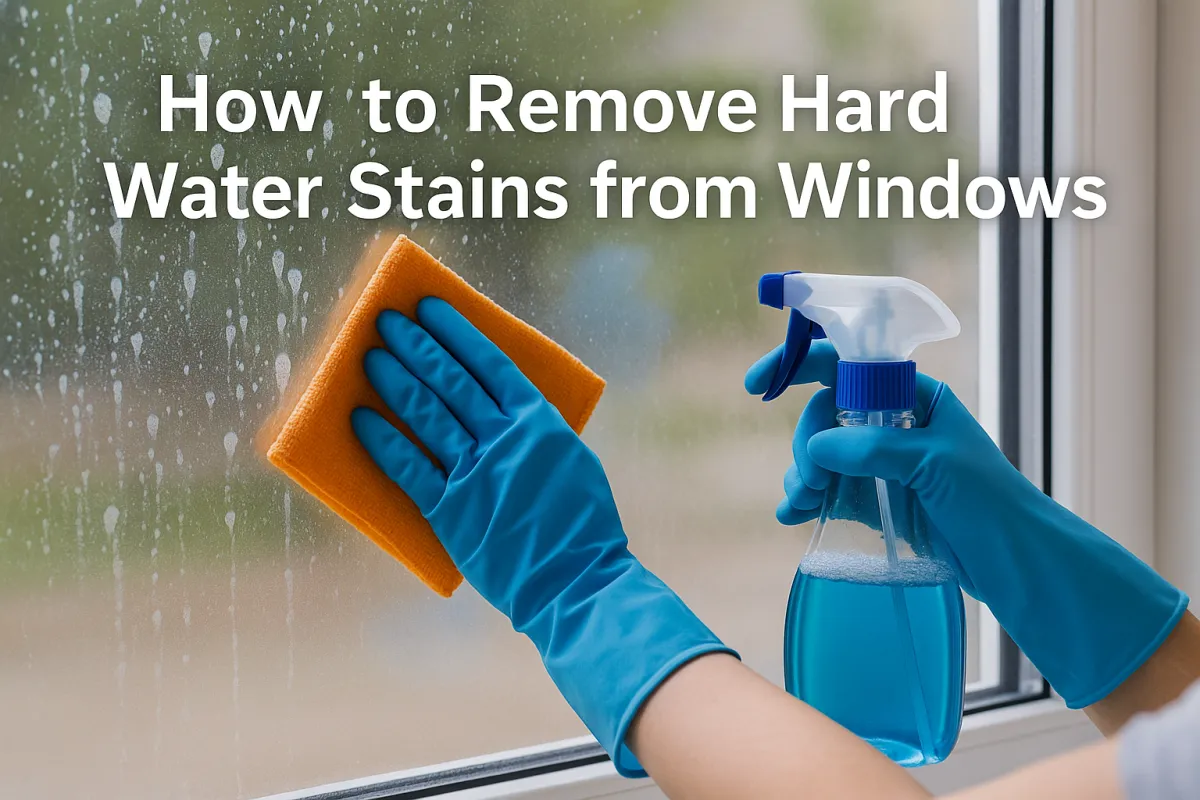
How To Remove Hard Water Stains from Windows
Hard water stains are one of the most frustrating challenges for homeowners and businesses alike. Those cloudy, chalky streaks on your windows come from mineral deposits—mainly calcium and magnesium—that build up when water evaporates. Left untreated, they can lead to glass etching and even permanent damage.
This guide breaks down the DIY cleaning methods you can use at home, explains why stains form in the first place, and when to call in professional help. Whether you prefer eco-friendly window cleaning or stronger commercial cleaners, you’ll leave with practical solutions to restore glass clarity and prevent future buildup.
Quick Summary
Why stains happen: Mineral-heavy water (sprinklers, rain, cleaning overspray) dries on glass, leaving deposits.
Best household solutions: Vinegar solution, lemon juice, or baking soda paste can remove most deposits.
Tools to use: Microfiber cloths, squeegees, and soft-bristle brushes prevent scratching and improve results.
Prevention tips: Regular cleaning, rain-repellent coatings, and keeping sprinklers aimed away from glass keep stains at bay.
Professional help: For etched or severely stained glass, specialist window cleaning services may be the only option.
Why Do Hard Water Stains Appear on Windows?
Hard water contains naturally occurring calcium and magnesium deposits. When water droplets dry on glass—whether from sprinkler water stains, rain, or even indoor condensation—they leave behind a thin, chalky residue. Over time, this residue thickens, creating soap scum-like films that simple glass cleaners can’t dissolve.
“Hard water spots aren’t just cosmetic. They can damage glass surfaces by etching them over time if left untreated.”
Other contributing factors include:
Poorly aimed garden sprinklers soaking exterior windows
Lack of protective coatings like hydrophobic treatments
Infrequent weekly maintenance cleaning, especially in hard water areas
Essential Tools for Window Glass Cleaning
Before trying any home remedy, make sure you have the right supplies. Improper tools can scratch the glass or simply smear stains around rather than remove them.
Recommended tools:
Microfiber cloth – Ideal for residue removal and streak-free drying
Squeegee – Helps achieve a professional finish and prevents new water spots
Spray bottle – For easy application of vinegar solution or DIY mixtures
Soft-bristle scrubbing brush – Effective on stubborn deposits without damaging glass
Magic eraser (melamine sponge) – A mild abrasive option for tougher buildup
For homeowners who prefer professional-grade tools, companies like Pivotal Window Cleaning often use commercial equipment that minimizes streaks and maximizes efficiency.
Natural Cleaners vs. Commercial Products
When tackling hard water removal hacks, many people debate between natural cleaners (like vinegar and lemon juice) and store-bought commercial cleaners designed for glass.
Natural options:
White vinegar (acidic cleaning solution) breaks down lime scale deposits
Lemon juice offers similar acidity with a fresh scent
Baking soda paste adds gentle abrasion for stubborn stains
Commercial options:
Products formulated specifically for glass often work faster but may contain stronger chemicals
Best for severe soap scum removal or etching prevention
Tip: Always test any cleaner—natural or commercial—on a small area first to avoid streaks or damage.
Preparing Your Windows for Cleaning
Before applying any solution, it’s critical to clean away loose dirt and debris. Dust, pollen, and bird droppings can mix with cleaning solutions and create streaks if not removed first.
Rinse the window with filtered or softened water if possible.
Wipe down the frame and seals to avoid dragging grit across the glass.
Check for signs of window seal protection issues—damaged seals can allow water to seep in and cause interior stains.
Gather your chosen cleaner, spray bottle, and drying materials before starting.
If you prefer not to handle this process yourself, you can always request a quote online for expert cleaning services.
Step-by-Step DIY Cleaning Methods for Removing Stubborn Stains
Hard water stains may look permanent, but several tried-and-true home remedies can restore glass clarity without harsh chemicals. Below are three methods that work on outdoor window water spots and indoor glass alike.
1. Vinegar Solution Method
A vinegar solution is one of the most effective and non-toxic glass cleaners you can use:
What You’ll Need:
White distilled vinegar
Spray bottle
Microfiber cloth
Soft-bristle scrubbing brush
Instructions:
Fill the spray bottle with a 50/50 mix of vinegar and water.
Spray generously across the window, ensuring mineral deposits are saturated.
Let sit for at least 5–10 minutes. For stubborn stains, apply undiluted vinegar.
Gently scrub with the brush using circular motions.
Rinse with clean water and dry thoroughly using a squeegee or microfiber cloth.
Pro tip: On hot days, work in shaded conditions to prevent vinegar from drying too quickly.
2. Lemon Juice and Baking Soda Paste Combo
This method pairs the acidity of lemon with the mild abrasiveness of baking soda paste:
Slice a fresh lemon in half and rub it directly onto stained areas.
For more stubborn deposits, create a paste: 3 parts baking soda to 1 part water.
Apply the paste with a microfiber cloth and scrub gently.
Rinse thoroughly to prevent residue from leaving streaks.
Finish with a clean, dry cloth for a polished result.
This combo works well on lime scale deposits and soap scum removal without harsh fumes.
3. Magic Eraser for Heavy Buildup
When vinegar and lemon solutions aren’t enough, a melamine sponge (magic eraser) provides additional grit:
Dampen the sponge slightly and rub gently over stubborn mineral deposits.
Follow with a vinegar rinse and a newspaper for streak-free shine.
Note: This should be done cautiously to avoid scratching delicate glass surfaces.
Beyond DIY: When Commercial Cleaners Are Useful
Sometimes natural cleaners can’t fully restore glass clarity, especially if stains have caused glass etching. In those cases, a commercial cleaner formulated for hard water removal may be necessary. These products often:
Contain stronger acidic compounds
Work faster on built-up deposits
Require careful rinsing to prevent residue
If you’re unsure which product is safe for your windows, consult a professional service like Pivotal Window Cleaning for tailored advice and application.
Preventing Future Hard Water Stains
Once your windows are clean, it’s worth taking steps to prevent stains from reappearing. Prevention saves time and reduces the risk of long-term damage.
Apply Water-Repellent Products
Coatings such as rain-repellent treatments or carnauba wax for windows create a hydrophobic barrier. Water beads up and rolls away instead of clinging to the glass, reducing mineral buildup.
Adjust Sprinklers and Gutters
Ensure sprinklers don’t spray directly onto windows.
Inspect gutters to prevent overflow and reduce water streaking on exterior glass.
Weekly Maintenance Cleaning
Regular upkeep—like wiping windows with a diluted vinegar solution—helps avoid heavy deposits. This is especially important in areas with known hard water issues.
Professional Window Cleaning Solutions
While DIY cleaning methods work for most homes, some stains are too deeply set to remove entirely. This happens when mineral deposits have etched into the glass surface, leaving a rough texture or cloudy appearance that simple scrubbing can’t fix.
In these cases, hiring professionals can be more cost-effective than replacing the glass. Companies like Pivotal Window Cleaning have access to:
Specialist acidic cleaning solutions that break down stubborn calcium and magnesium buildup
Professional-grade squeegees and microfiber drying systems that leave a streak-free finish
Hydrophobic coatings to reduce future spotting and extend cleaning intervals
Professionals can also identify early signs of seal failure or damage around window frames, preventing leaks and drafts.
Long-Term Maintenance Tips
Even after stains are removed, ongoing maintenance is key to preventing recurrence. Here are strategies to keep your windows looking clear year-round:
1. Regular Rinsing and Drying
Rinse windows with filtered or softened water after heavy rain or sprinkler use.
Dry with a microfiber cloth or squeegee to avoid residue buildup.
2. Protective Coatings
Apply rain-repellent coatings every 3–6 months.
Consider adding carnauba wax for windows for added protection against limescale and environmental grime.
3. Schedule Seasonal Deep Cleans
Seasonal cleaning prevents soap scum removal challenges and heavy mineral buildup.
For high windows or commercial properties, booking professional help ensures safety and thoroughness.
Tip: If you’re unsure about the hardness of your water supply, local window cleaning companies can often test it and recommend tailored solutions.
When to Replace vs. Restore
Sometimes cleaning isn’t enough—especially when glass etching prevention wasn’t addressed early on. If windows remain cloudy after multiple treatments:
Check whether the damage is surface-level (can be polished) or deep (may require replacement).
Consult specialists who can evaluate cost-effectiveness compared to new installations.
Why Choose Professional Help in the UK?
Pivotal Window Cleaning serves homes and businesses across the UK with reliable, eco-friendly window cleaning solutions. From domestic properties to large commercial sites, we handle:
Routine maintenance (weekly, monthly, or quarterly)
One-off hard water stain removal
Comprehensive cleaning for windows, frames, and seals
If you’re ready to restore your windows to crystal clarity, request a quote today and discover tailored services for your area.
Additional FAQs on Removing Hard Water Stains from Windows
1. Can hard water stains permanently damage window glass?
Yes, if left untreated, mineral deposits can etch the surface of glass over time. This etching creates a cloudy appearance that cannot be removed by cleaning alone and may require polishing or replacement.
2. Are there eco-friendly alternatives to chemical cleaners?
Absolutely. Natural cleaners like vinegar, lemon juice, and baking soda paste are effective at breaking down calcium and magnesium deposits without harmful fumes or residues.
3. Will rainwater cause new stains after I clean my windows?
Rainwater itself is typically soft, but if it mixes with airborne pollutants or runs through mineral-heavy gutters, it can leave outdoor window water spots. Applying rain-repellent coatings helps minimize this risk.
4. Can I use steel wool on hard water stains?
Fine-grade steel wool (#0000) can be used carefully for stubborn stains, but it’s risky. A soft-bristle scrubbing brush or magic eraser is safer to avoid scratching the glass.
5. How often should I clean my windows to prevent buildup?
For homes in hard water areas, weekly maintenance cleaning with a diluted vinegar solution can prevent stains from forming and reduce deep cleaning frequency.
6. Does softened water prevent hard water stains entirely?
Softened water significantly reduces mineral deposits, but it doesn’t eliminate other contaminants like soap scum or environmental grime, so regular cleaning is still necessary.
7. Can carnauba wax really protect windows from spots?
Yes. Carnauba wax for windows creates a slick barrier that repels water and makes future cleaning easier. It’s especially helpful on exterior glass exposed to sprinklers or rain.
8. Are commercial cleaners safe for tinted or coated glass?
Not all are safe. Always check the manufacturer’s label. Harsh acids can damage hydrophobic coatings or window tints, so test a small area first or consult a professional.
9. Will a professional cleaning service remove etching?
Professional cleaners can remove most surface stains and light etching, but deep etching may require specialized polishing or glass replacement.
10. Can I prevent hard water stains without frequent cleaning?
Preventative measures like adjusting sprinklers, applying water-repellent products, and using filtered water for washing can dramatically reduce buildup, minimizing the need for frequent cleaning.
